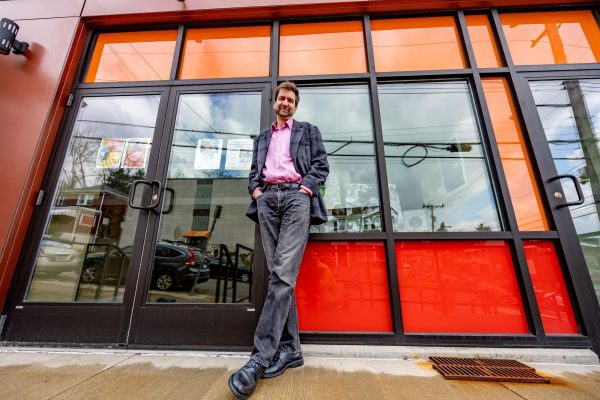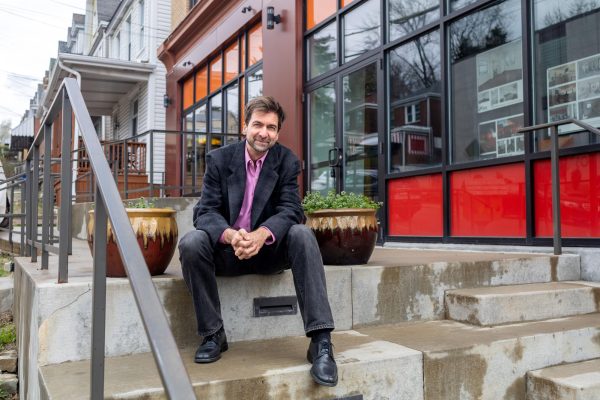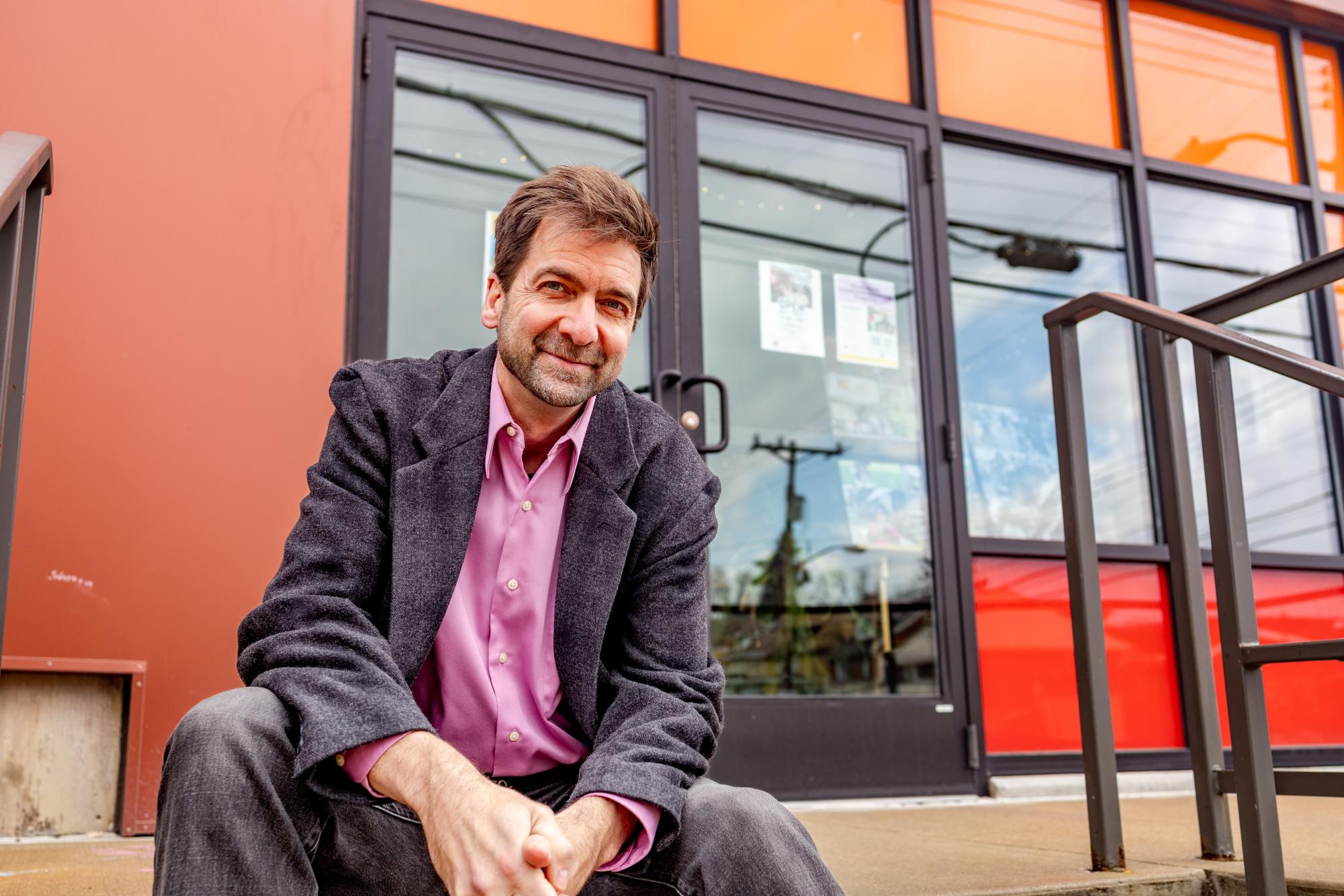Walking into Mark Kramer’s office is like entering a mosaic of mementos. Pictures of his two children sit on his desk, and trinkets cover shelves along one wall. The shelves are also full of books that reflect one of his greatest passions — creative writing.
Kramer said he discovered his love for writing while pursuing a bachelor’s degree at Miami University, but writing is just one of his many interests. After college, Kramer devoted time to community service and spent a year leading volunteer groups in Northeast Kentucky.
“That was pretty formative, just to volunteer and be with people who were having experiences that were new to them,” Kramer said. “We were getting our hands dirty building houses while meeting new people and experiencing a culture the students had never experienced..”
Service remains an important theme in Kramer’s work and teaching. Following a stint in freelance journalism, Kramer earned his Master of Fine Arts at Pitt in 2009 and has worked at the University ever since. Currently, he is a teaching professor in the English department.
“I see myself as a co-learner, as a teacher,” Kramer said. “I have expertise, I tell students, but I also want to hear their expertise and their experiences.”
In 2010, Kramer helped found The Corner, a community center in West Oakland that serves as a neighborhood outlet for the arts and social justice advocacy. Kramer said he lived in West Oakland at the time specifically because of his desire to be involved in community service.
“I volunteered there for several years before becoming the executive director, and that taught me a lot about community work,” Kramer said. “I would say that’s been pretty central to my experience at Pitt as well.”
Kramer describes himself as a “writer and empathy farmer” on his website, and he stressed empathy as a core theme both in the classroom and in his writing.
“Empathy has been a long-term interest for me,” Kramer said. “In some ways, I feel like all my writing has been about empathy.”
Kramer believes the ideal classroom environment is inclusive and democratic, pointing to one memorable class period in which students asked questions that took the class in a new direction.
“I actually ended up almost on the outside of the conversation, and I said, ‘Hey, just run with it,’” Kramer said. “I’m continually trying to democratize the room as much as I can and let students take the lead.”
For Kramer, his philosophy on teaching ultimately returns to empathy, providing takeaways for his students that go beyond improved writing.
“My writing is about helping myself and my students understand what life is like in somebody else’s shoes,” Kramer said. “That’s an aspiration that I think we should all have.”
Gayle Rogers, Andrew W. Mellon Professor of English and department chair, has worked with Kramer for over 15 years. In 2019, he helped nominate Kramer for the Chancellor’s Distinguished Service Award, which Pitt awarded to him in recognition of his work.
“His students praise him endlessly for his dedication to helping them improve as writers through engagements with communities in need, especially communities that are not their own,” Rogers said. “It’s a remarkable skill.”
Cheyenne Filous graduated from Pitt in 2018 and said her experience with Kramer as a professor was “invaluable.”
“Mark created an atmosphere in class that felt both safe and empowering for all students to be subjected to constructive criticism — a necessary experience,” Filous said. “He went above and beyond in his role as an educator, and in him I found a mentor, an advocate and a friend.”

Kramer’s freelance work has appeared on various news sites, including PublicSource, The Atlantic and Pittsburgh Quarterly. In 2006, he published a book titled “Dispossessed: Life in Our World’s Urban Slums,” in which he spent four years researching informal settlements worldwide. Whether in an article or a book, Kramer said his work always returns to understanding the experiences of others.
“Whether my writing is about informal settlements in another country or writing about the city of Pittsburgh, it’s about helping people have a vicarious experience,” Kramer said.
Kramer also desires to understand history through empathy. When the travel and food show “Anthony Bourdain: Parts Unknown” released an episode about Pittsburgh in 2017, Kramer authored a piece for the show’s website about the Civic Arena in the Hill District. This article profiled one of the more than 8,000 residents of the historically African American neighborhood displaced by the arena’s construction.
“I got to write a piece that highlighted the life of somebody who grew up in the Hill and became a community leader,” Kramer said. “I was glad for that because it showed the context of the neighborhood as opposed to just the food featured in the show.”
Kramer finds himself more comfortable in nature than in the city and sometimes feels as if he doesn’t fit into the Pittsburgh landscape.
“I’m a little surprised I work in urban spaces, because I don’t feel like I fit in some ways,” Kramer said. “I grew up on five acres of land in rural Ohio, and I miss the woods.”
As an outdoors enthusiast in an urban setting, Kramer said much of his writing is focused on the intersection of urban spaces with the natural environment.
“I’m interested in income inequality, race and neighborhood change, but I’ve also been writing on urban nature and the integration of green spaces and urban spaces in Pittsburgh,” Kramer said. “And that does come back to justice issues too.”
Many of Kramer’s articles reflect these themes, such as “The Urban Deerhunter,” which describes camouflaged deer hunters who hunt in wooded pockets around the city. Another article, one that he cited as a favorite, investigated the owner of a troubled apartment complex in Penn Hills. Despite Kramer’s inclination to the outdoors, he said Pittsburgh offers no shortage of interesting topics for his writing.

JC Lee, a teaching professor in the English department, has long appreciated Kramer’s kindness.
“He’s one of the most down-to-earth people I know,” Lee said. “What I love about his teaching is that he has students get out of their own lives and experience a place that is unfamiliar to them.”
In the two decades that Lee has known him, many students have told Lee they enjoyed Kramer’s classes.
“I often have students come through my classes who have taken Intermediate Nonfiction with Mark, and it’s been their favorite writing class,” Lee said.
In the classroom, Kramer shares lessons learned through his own writing with his students but does not consider himself as “merely handing down expertise.” Kramer said he desires to learn alongside his students, and hearing their insights is why he enjoys being an educator.
“We’re here to continually work toward an approximation of understanding, but we never fully arrive at understanding, and that’s the educational process,” Kramer said. “It’s not about becoming experts but to continually unlearn what we thought we knew.”
When asked how he hopes to impact his students, Kramer said although improving one’s writing is an important goal, he wants to impart empathy and understanding to his students above all.
“I want us to be thinking about who we are to other people around us,” Kramer said. “I do want [my students] to become more thoughtful writers … but I think even more than that, I want them to grow as people.”


